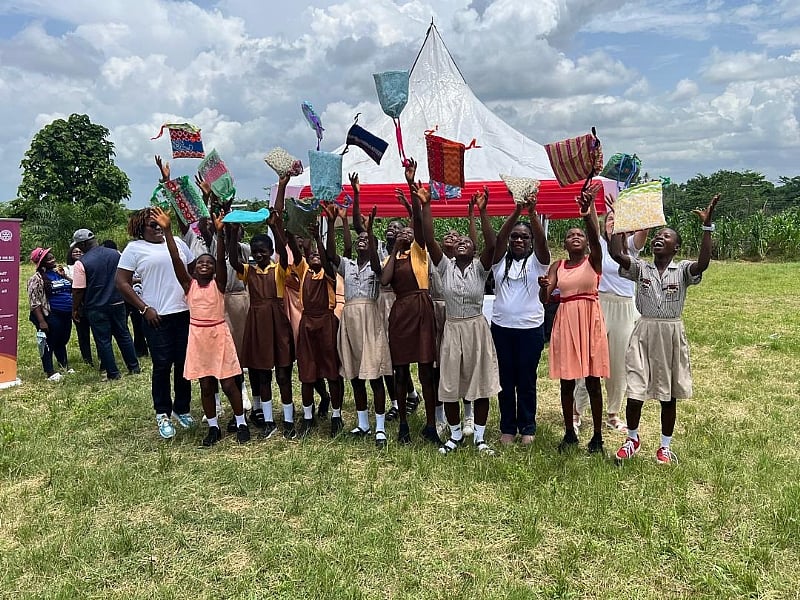World Menstrual Hygiene Day, observed annually on May 28th, serves as a crucial platform to raise awareness about the importance of menstrual hygiene management. This year, Empower Playgrounds, a non-governmental organization dedicated to empowering children in rural Ghana, partnered with the Rotary Club of Accra Kanda and Rotaract Club of Accra Adabraka to commemorate the day with a meaningful initiative. They organized an event at Attabui M/A Basic School in the Eastern Region of Ghana, focusing on providing reusable menstrual kits to young girls and educating them about menstrual health and hygiene. This event, attended by twelve basic and junior high schools, underscores the commitment of these organizations to improving the lives of young girls in underserved communities.
The headteacher of Attabui M/A Basic School, Madam Hannah Kensema Saforo, expressed her deep appreciation for Empower Playgrounds’ continuous efforts in transforming education through impactful projects. She highlighted the significance of such initiatives in empowering students, particularly girls, to reach their full potential. Madam Saforo emphasized that these seemingly small acts of support contribute significantly to building a brighter future for these young learners, paving the way for them to achieve greater academic and personal success. Her words resonated with the theme of the day, emphasizing the vital role of menstrual hygiene management in enabling girls to pursue their education uninterrupted.
Mr. Edward Doe, the School Health Education Program Coordinator for Akuapem North Municipal, echoed the importance of open conversations and destigmatizing menstruation. He advocated for increased accessibility to sanitary facilities and menstrual products across all sectors, emphasizing that these provisions are essential for fostering a supportive environment for young girls. Mr. Doe’s call to action highlights the systemic changes needed to ensure that girls have the resources and support they require to manage their menstrual health with dignity and confidence. This aligns with the global movement to break down the barriers that prevent girls from accessing education and opportunities due to period poverty and stigma.
Madam Peace Yeri, a representative from Empower Playgrounds, played a crucial role in educating the girls about the various stages of adolescence and the menstrual cycle. She provided practical guidance on using and maintaining the reusable menstrual kits, empowering them to manage their periods hygienically and confidently. This hands-on approach ensured that the girls not only received essential supplies but also gained the knowledge and skills to use them effectively. Madam Yeri’s session further reinforced the importance of menstrual health education, equipping the girls with the information they need to navigate this natural bodily function with confidence and without shame.
The girls who received the reusable menstrual kits expressed their sincere gratitude for the support, emphasizing the positive impact such initiatives have on their lives and education. Their voices underscored the need for continued investment in menstrual health and hygiene programs, particularly in rural communities where access to such resources is often limited. Their request for more educational programs and health products highlighted the ongoing need for sustainable solutions to ensure that girls can manage their periods with dignity and continue their education without interruption.
The event brought together a diverse group of stakeholders, including district school inspectors, health educationists, parents, and community leaders, further highlighting the collaborative approach needed to address menstrual hygiene management effectively. The presence of these key individuals demonstrates the growing recognition of menstrual health as a crucial component of overall health and well-being, requiring a concerted effort from various sectors of society. This multi-faceted approach ensures that the message reaches a wider audience, promoting greater understanding and support for menstrual hygiene initiatives.
The provision of reusable menstrual kits is particularly significant for several reasons. First, it addresses the issue of affordability and accessibility. In many communities, disposable sanitary products are expensive and difficult to obtain, leading to girls missing school or resorting to unhygienic alternatives. Reusable kits offer a sustainable and cost-effective solution, ensuring that girls have a reliable and hygienic option for managing their periods. Second, the use of reusable kits contributes to environmental sustainability by reducing the reliance on disposable products and minimizing waste. This aligns with broader efforts to promote environmentally conscious practices and protect the planet.
Furthermore, the educational component of the program is crucial for breaking down the taboos and stigma surrounding menstruation. By providing accurate information and creating a safe space for open discussion, the program empowers girls to understand their bodies and manage their periods with confidence. This approach challenges the societal norms that often silence conversations about menstruation, contributing to a more open and supportive environment for girls.
The collaboration between Empower Playgrounds, Rotary Club of Accra Kanda, and Rotaract Club of Accra Adabraka exemplifies the positive impact that can be achieved through partnerships. By pooling resources and expertise, these organizations are able to reach more girls and provide them with the support they need to thrive. This collaborative approach not only amplifies the reach of menstrual hygiene initiatives but also fosters a sense of community ownership and sustainability.
The commemoration of World Menstrual Hygiene Day at Attabui M/A Basic School serves as a testament to the power of education, advocacy, and community engagement in addressing the challenges faced by girls during menstruation. By providing reusable menstrual kits and promoting open conversations about menstrual health, this initiative empowers girls to manage their periods with dignity, attend school regularly, and reach their full potential. It also highlights the importance of continued investment in menstrual hygiene management as a critical component of achieving gender equality and empowering girls and women worldwide. The ripple effect of this event extends beyond the individual girls who received the kits, fostering a more informed and supportive community that embraces menstrual health as a fundamental right.














